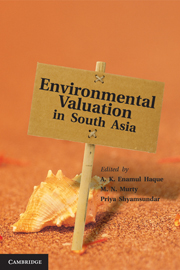Book contents
- Frontmatter
- Contents
- List of Figures
- List of Tables
- List of Appendices
- List of Contributors
- Preface
- Chapter 1 Introduction
- Chapter 2 Environmental Valuation: A Review of Methods
- Chapter 3 Valuing the Environment as a Production Input
- Chapter 4 Should Shrimp Farmers Pay Paddy Farmers?: The Challenges of Examining Salinization Externalities in South India
- Chapter 5 Evaluating Gains from De-Eutrophication of the Dutch Canal in Sri Lanka
- Chapter 6 Pesticide Productivity and Vegetable Farming in Nepal
- Chapter 7 Forests, Hydrological Services, and Agricultural Income: A Case Study from the Western Ghats of India
- Chapter 8 Can Mangroves Minimize Property Loss during Big Storms?: An Analysis of House Damages due to the Super Cyclone in Orissa
- Chapter 9 Valuation of Recreational Amenities from Environmental Resources: The Case of Two National Parks in Northern Pakistan
- Chapter 10 Valuing the Land of Tigers: What Indian Visitors Reveal
- Chapter 11 Estimating Welfare Losses from Urban Air Pollution using Panel Data from Household Health Diaries
- Chapter 12 Children in the Slums of Dhaka: Diarrhoea Prevalence and its Implications
- Chapter 13 Red Wells, Green Wells and the Costs of Arsenic Contamination in Bangladesh
- Chapter 14 Air Quality and Cement Production: Examining the Implications of Point Source Pollution in Sri Lanka
- Chapter 15 Revisiting the Need for Improved Stoves: Estimating Health, Time and Carbon Benefits
- Chapter 16 Benefits from Reduced Air Pollution in Delhi and Kolkata: A Hedonic Property Price Approach
- Chapter 17 The Value of Statistical Life
- Chapter 18 An Assessment of Demand for Improved Household Water Supply in Southwest Sri Lanka
- Index
Chapter 11 - Estimating Welfare Losses from Urban Air Pollution using Panel Data from Household Health Diaries
Published online by Cambridge University Press: 05 November 2012
- Frontmatter
- Contents
- List of Figures
- List of Tables
- List of Appendices
- List of Contributors
- Preface
- Chapter 1 Introduction
- Chapter 2 Environmental Valuation: A Review of Methods
- Chapter 3 Valuing the Environment as a Production Input
- Chapter 4 Should Shrimp Farmers Pay Paddy Farmers?: The Challenges of Examining Salinization Externalities in South India
- Chapter 5 Evaluating Gains from De-Eutrophication of the Dutch Canal in Sri Lanka
- Chapter 6 Pesticide Productivity and Vegetable Farming in Nepal
- Chapter 7 Forests, Hydrological Services, and Agricultural Income: A Case Study from the Western Ghats of India
- Chapter 8 Can Mangroves Minimize Property Loss during Big Storms?: An Analysis of House Damages due to the Super Cyclone in Orissa
- Chapter 9 Valuation of Recreational Amenities from Environmental Resources: The Case of Two National Parks in Northern Pakistan
- Chapter 10 Valuing the Land of Tigers: What Indian Visitors Reveal
- Chapter 11 Estimating Welfare Losses from Urban Air Pollution using Panel Data from Household Health Diaries
- Chapter 12 Children in the Slums of Dhaka: Diarrhoea Prevalence and its Implications
- Chapter 13 Red Wells, Green Wells and the Costs of Arsenic Contamination in Bangladesh
- Chapter 14 Air Quality and Cement Production: Examining the Implications of Point Source Pollution in Sri Lanka
- Chapter 15 Revisiting the Need for Improved Stoves: Estimating Health, Time and Carbon Benefits
- Chapter 16 Benefits from Reduced Air Pollution in Delhi and Kolkata: A Hedonic Property Price Approach
- Chapter 17 The Value of Statistical Life
- Chapter 18 An Assessment of Demand for Improved Household Water Supply in Southwest Sri Lanka
- Index
Summary
Introduction
Air Pollution is a major environmental problem in both developed and developing countries. The harmful effects of air pollution include corrosion of metals and buildings, reduction in visibility, degradation of soil due to acid rain, depletion of the ozone layer, global warming and damages to human health. However, researchers are more concerned with damages to human health as human capital is the primary contributor to economic welfare. The health effects are more intense in urban cities with significant emission sources, unfavourable dispersion characteristics and high population densities. Many health problems like eye irritation, respiratory illnesses etc., may be directly attributable to exposure to air pollution. If not treated in time, acute illnesses may become chronic due to prolonged and continuous exposure to air pollution. Air pollution induced illnesses result in increased expenditures on mitigating activities and a loss in wages to people. Welfare gains would occur if air quality is improved to safe levels.
The link between exposure to air pollution and health-related social costs is well established in the west. Studies in the past have used the benefit transfer approach to estimate the willingness to pay for improved air quality (Alberini and Krupnick, 1997) in developing countries. However, this method, which relies on developed country estimates, does not take into consideration country specific socio-economic characteristics, baseline health, behavioural responses, pollution levels, characteristics of pollutants, weather conditions etc. and therefore may yield misleading results.
- Type
- Chapter
- Information
- Environmental Valuation in South Asia , pp. 256 - 275Publisher: Cambridge University PressPrint publication year: 2011
- 3
- Cited by



